小学六年级英语总复习资料(Word版,23页)(已审阅)
六年级英语总复习资料内容
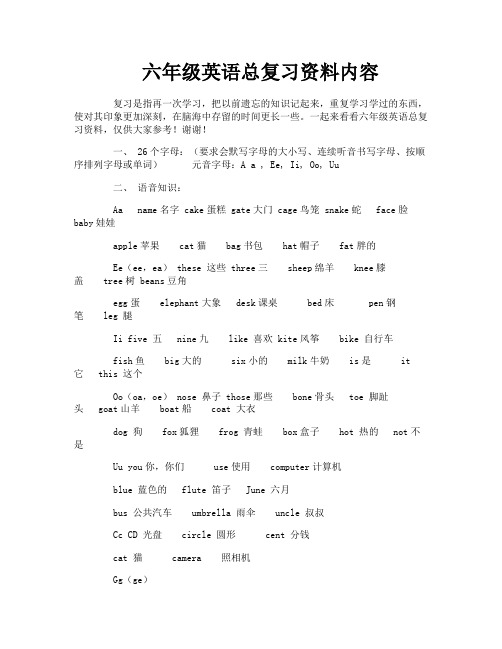
六年级英语总复习资料内容复习是指再一次学习,把以前遗忘的知识记起来,重复学习学过的东西,使对其印象更加深刻,在脑海中存留的时间更长一些。
一起来看看六年级英语总复习资料,仅供大家参考!谢谢!一、 26个字母:(要求会默写字母的大小写、连续听音书写字母、按顺序排列字母或单词)元音字母:A a , Ee, Ii, Oo, Uu二、语音知识:Aa name名字 cake蛋糕 gate大门 cage鸟笼 snake蛇face脸baby娃娃apple苹果 cat猫 bag书包 hat帽子 fat胖的Ee(ee,ea) these 这些 three三 sheep绵羊 knee膝盖 tree树 beans豆角egg蛋 elephant大象desk课桌bed床 pen钢笔 leg 腿Ii five 五nine九 like 喜欢 kite风筝 bike 自行车fish鱼 big大的six小的 milk牛奶 is是it它this 这个Oo(oa,oe) nose 鼻子 those那些 bone骨头toe 脚趾头goat山羊 boat船 coat 大衣dog 狗 fox狐狸 frog 青蛙 box盒子 hot 热的not不是Uu you你,你们use使用 computer计算机blue 蓝色的flute 笛子June 六月bus 公共汽车 umbrella 雨伞 uncle 叔叔Cc CD 光盘 circle 圆形cent 分钱cat 猫camera 照相机Gg(ge)orange 桔子 giraffe 长颈鹿page 页frog 青蛙 girl 女孩big 大的gate 大门th thin 瘦的 three 三thirteen 十三mouth 嘴mother 妈妈 father 爸爸 brother 兄弟 they 他们this 这个 that 那个feather 羽毛whwhat 什么 when 什么时候where 哪里why 为什么which 哪一个white 白色的water水 woman 女人walk 走who 谁whose 谁的ar car 汽车park 公园farm 农场arm手臂 star星星ir girl 女孩bird 鸟nurse护士purse 钱包 turtle 海龟third第三hurt 疼ow cow奶牛owl 猫头鹰house 房子mouse 鼠,鼠标cloudy 多云的oyoi boy 男孩 toy 玩具 oyster 贝壳oil 油coin 硬币 boil 沸腾oroor horse 马 store 商店 corn 玉米door 门floor 地板airear chair 椅子hair 头发 pear 梨bear 熊oobook 书 good 好的 look 看 foot 脚moon 月亮 food 食物pool 池子 room房间字母s或es的发音:字母s在词首发音为/s/, 在中间如:usually, television, treasure, casual中发音为/ /;以/p/, /t/, /k/ 清音收尾,读音为/s/;其他情况一般读音为/z/;以s, x, ch, sh 收尾加es的,es读音为/iz/。
六年级英语总复习资料

六年级英语总复习资料六年级英语总复习资料在六年级的学习生涯即将结束之际,为了帮助大家更好地复习英语知识,我整理了一份六年级英语总复习资料。
希望这份资料能够为大家的英语学习提供一些有益的帮助。
一、词汇复习词汇是英语学习的基础,掌握了足够的词汇量,才能更好地理解和运用语言。
以下是一些六年级常见的词汇:1. 动词:run, jump, swim, dance, sing, play, read, write, draw, paint, eat, drink, sleep, study, listen, speak, help, like, love, hate, want, need等。
2. 名词:book, pen, pencil, bag, desk, chair, table, computer, school, teacher, student, friend, parent, brother, sister, cat, dog, bird, tree, flower, city, country等。
3. 形容词:big, small, tall, short, happy, sad, angry, tired, hungry, thirsty, hot, cold, old, young, beautiful, ugly, clean, dirty, fast, slow等。
4. 副词:well, badly, quickly, slowly, loudly, quietly, often, always, sometimes, never等。
5. 介词:in, on, at, under, over, between, among, behind, in front of, next to等。
二、语法复习除了词汇,语法也是英语学习中不可或缺的一部分。
以下是一些六年级常见的语法知识点:1. 时态:一般现在时、一般过去时、一般将来时、现在进行时等。
六年级英语总复习总结资料.doc
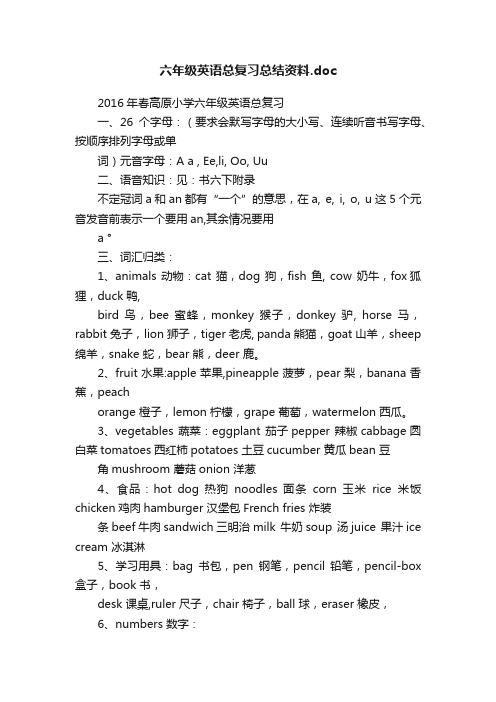
六年级英语总复习总结资料.doc2016年春高原小学六年级英语总复习一、26个字母:(要求会默写字母的大小写、连续听音书写字母、按顺序排列字母或单词)元音字母:A a , Ee,li, Oo, Uu二、语音知识:见:书六下附录不定冠词a和an都有“一个”的意思,在a, e, i, o, u这5个元音发音前表示一个要用an,其余情况要用a °三、词汇归类:1、animals 动物:cat 猫,dog 狗,fish 鱼, cow 奶牛,fox狐狸,duck鸭,bird 鸟,bee 蜜蜂,monkey 猴子,donkey 驴, horse 马,rabbit 兔子,lion 狮子,tiger 老虎, panda 熊猫,goat 山羊,sheep 绵羊,snake 蛇,bear 熊,deer 鹿。
2、fruit 水果:apple 苹果,pineapple 菠萝,pear 梨,banana 香蕉,peachorange 橙子,lemon 柠檬,grape 葡萄,watermelon 西瓜。
3、vegetables 蔬菜:eggplant 茄子pepper 辣椒cabbage圆白菜tomatoes西红柿potatoes 土豆cucumber 黄瓜bean 豆角mushroom 蘑菇onion 洋葱4、食品:hot dog 热狗noodles 面条corn 玉米rice米饭chicken鸡肉hamburger 汉堡包French fries 炸装条beef牛肉sandwich三明治milk 牛奶soup 汤juice 果汁ice cream 冰淇淋5、学习用具:bag书包,pen钢笔,pencil 铅笔,pencil-box 盒子,book 书,desk 课桌,ruler 尺子,chair 椅子,ball 球,eraser 橡皮,6、numbers 数字:1)基数词:One 1, two 2, three 3, four 4, five 5, six 6, seven 7, eight8, nine 9, ten 10 , eleven 11, twelve 1 2, thirteen 1 3, fourteen 14, fifteen 1 5, sixteen 16, seventeen 17 , eighteen 1 8, nineteenl9, twenty20, twenty-one 21, twenty-six 26, ............................... t hirty 30, forty40, fifty 50, sixty 60 , seventy 70, eighty 80, ninety 90, one hundred 1 002)序数词:first 第一,second 第二,third 第三,fourth第四,fifth第五,Sixth 第六,seventh 第七,eighth 第八,ninth 第A,tenth 第十,twelfth 第十二,twentieth 第二十。
小学六年级英语全套复习资料
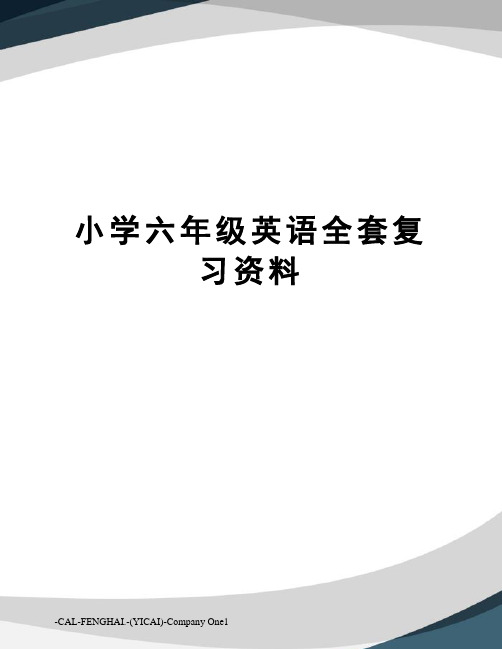
小学六年级英语全套复习资料-CAL-FENGHAI.-(YICAI)-Company One1英语复习资料教师版·复习资料(讲义·答案)·试卷分析(答案·分析)·学生资料(资料·卡表)小学六年级英语复习资料目录第一部分复习资料1、一般过去时(讲义)............................................................................................................................................P1(答案)............................................................................................................................................P32、一般现在时(讲义)............................................................................................................................................P7(答案)............................................................................................................................................P93、一般将来时(讲义)............................................................................................................................................P17(答案)............................................................................................................................................P194、现在进行时(讲义)............................................................................................................................................P23(答案)............................................................................................................................................P255、 There be (讲义)............................................................................................................................................P27(答案)............................................................................................................................................P296、情态动词(讲义)............................................................................................................................................P33(答案)............................................................................................................................................P357、时态对比(讲义)............................................................................................................................................P37(答案)............................................................................................................................................P418、比较级(讲义)............................................................................................................................................P49(答案)............................................................................................................................................P519、 be 和 do (讲义)............................................................................................................................................P53(答案)............................................................................................................................................P5710、人称和数(讲义)............................................................................................................................................P59(答案)............................................................................................................................................P6111、单词短语(答案)............................................................................................................................................P6512、教材知识整理............................................................................................................................................................P6913、英语作文(答案)............................................................................................................................................P7714、其他............................................................................................................................................................................ P81第二部分试卷分析1、期中检测试卷T2(答案)........................................................................................................................................P832、单元检测试卷R1(答案)........................................................................................................................................P87(分析)........................................................................................................................................P913、单元检测试卷R2(答案)........................................................................................................................................P93(分析)........................................................................................................................................P974、第一次模拟试卷(答案)........................................................................................................................................P99(分析)........................................................................................................................................P1035、第二次模拟试卷(答案)........................................................................................................................................P105(分析)........................................................................................................................................P1096、第三次模拟试卷(答案)........................................................................................................................................P111(分析)........................................................................................................................................P115第三部分学生资料1、学生读背句型............................................................................................................................................................P1172、学生错题卡................................................................................................................................................................P1213、学生单词错漏卡........................................................................................................................................................P123一般过去时answer ed ask ed brush ed catch ed clean ed climb ed collect ed cook ed count ed finish ed fish ed guess ed help ed join ed jump ed kick ed learn ed listen ed look ed open ed pass ed perform ed plant ed reach ed row ed show ed snow ed talk ed touch ed turn ed visit ed walk ed wash ed watch ed work edclose d dance d hike d hope d like d live d love d move d recite d shine d skate d taste d use dcarry carr ied cry cr ied fly fl ied/fl ew study stud ied worry worr iedplay ed stay ed driveplan ned stop ped shop pedam are become begin buy build come cutdo draw drink drive eat feel find forget get give go have hear hide-hid hurt iskeep know leave let make meet put read ride run say see seek-sought sell send shut sing sit sleep sweep swim take teach tell think throw wake will win write一般过去时练习一、填空(一)写出下列动词的过去式形式answer ed ask ed bec a me beg a n clean ed climb ed close d collect ed c a me cook ed count ed cut dance d dr e w dr a nk dr o ve ate f ou nd forg o t g o t g a ve help ed hide-hid hike d hope d hurt join ed jump ed ke pt kick ed learn ed le ftlet like d listen ed live d look ed love d ma d e me t move d open ed perform ed plan ned plant ed put read recite d r o de row ed r a n s aw seek-s ough t shine d shop ped show ed s a t skate d sle pt snow ed stop ped sw a m t ook talk ed taste d turn ed use d visit ed w o ke walk ed work ed wr o te brush ed catch ed d id finish ed fish ed go-went guess ed pass ed reach ed t aught touch ed wash ed watch ed carr ied fl ied / fl ew stud ied worr ied cr ied b ought play ed s aid stay ed ha s w oulds a ng w o n kn e w thr e w sen t buil t swe pt fe ltshut th ought t old hear t s old am-was is-was are-were (二)用动词的适当形式填空。
小学六年级英语总复习资料
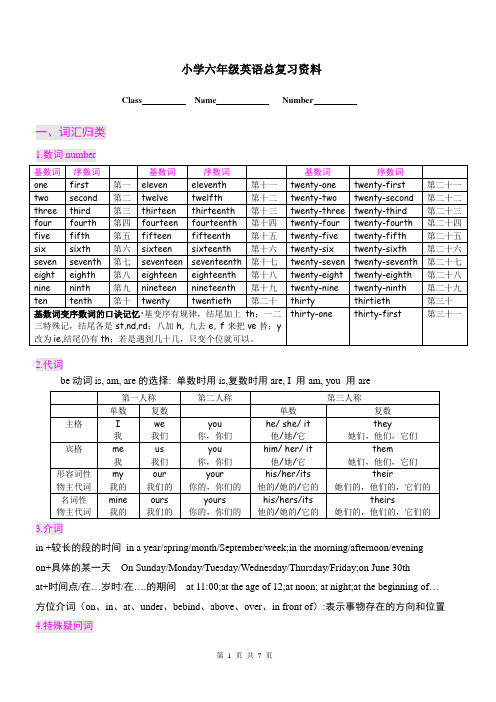
小学六年级英语总复习资料Class Name Number一、词汇归类1.数词number2.代词be动词is, am, are的选择: 单数时用is,复数时用are, I 用am, you 用are3.介词in +较长的段的时间in a year/spring/month/September/week;in the morning/afternoon/eveningon+具体的某一天On Sunday/Monday/Tuesday/Wednesday/Thursday/Friday;on June 30that+时间点/在…岁时/在….的期间at 11:00;at the age of 12;at noon; at night;at the beginning of…方位介词(on、in、at、under、bebind、above、over、in front of):表示事物存在的方向和位置4.特殊疑问词5.同音词I—eye, for—four, where—wear, pear—pair, see—sea, right-- write board—bored, sun—son, hour—our, one—won, here—hear, deer—dear, no—know, there—their, to-- too—two, by-- bye—buy6.缩写形式与完整形式isn’t=is not aren’t=are not I’m=I am it’s=it is can’t=can not could not=couldn’t she’s=she is he’s=he is you’re=you are we’re=we are don’t=do not doesn’t=does not they’re=they are what’s=what is who’s=who is that’s =that is did not=didn’t let’s=let us 二、Let’s spell三、语法点归类1.名词的运用单数名词:一般情况下用a可数名词以元音开头的单词用an (元音字母有:a e i o u)(如:an umbrella/ apple/egg/e-mail/ice cream/orange/umbrella/ elephant)复数名词:一般在词尾加s不可数名词如meat/milk/juice/water/tea/coffee/ soup2.名词单数变复数的规则3.形容词的比较级①形容词比较级的运用:将两个事物或人进行比较要用比较级,句型结构:4.四种时态(一般现在时、现在进行时、一般过去时、一般将来时)⑴一般现在时①用法:表示经常反复发生的动作、存在的状态或习惯性的动作的时态。
(完整)小学六年级英语总复习资料(开心英语版).doc
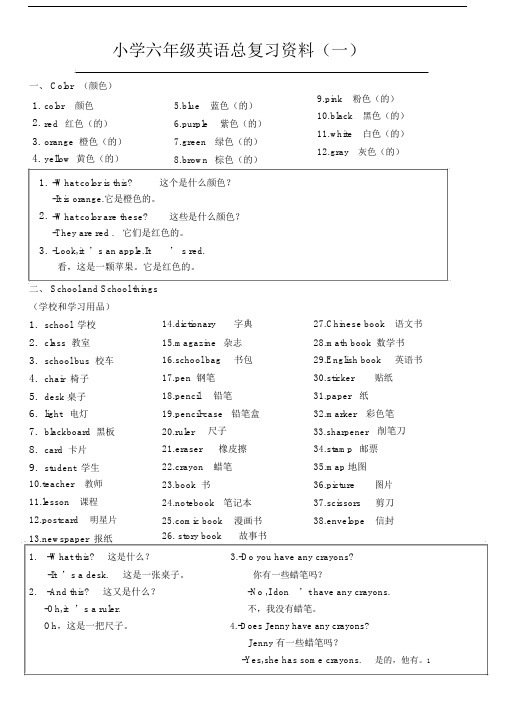
小学六年级英语总复习资料(一)一、 Color(颜色)1. color 颜色 5.blue 蓝色(的)2. red 红色(的) 6.purple 紫色(的)3. orange 橙色(的)7.green 绿色(的)4. yellow 黄色(的)8.brown 棕色(的)1. -What color is this? 这个是什么颜色?-It is orange.它是橙色的。
2. -What color are these? 这些是什么颜色?-They are red . 它们是红色的。
3. -Look,it ’s an apple.It ’ s red.看,这是一颗苹果。
它是红色的。
二、 School and School things(学校和学习用品)9.pink粉色(的)10.black黑色(的)11.white白色(的)12.gray灰色(的)1.school 学校2.class 教室3.school bus 校车4.chair 椅子5.desk 桌子6.light 电灯7.blackboard 黑板8.card 卡片9.student 学生10.teacher教师11.lesson课程12.postcard明星片13.newspaper 报纸1. -What this?这是什么?14.dictionary 字典27.Chinese book 语文书15.magazine 杂志28.math book 数学书16.school bag 书包29.English book 英语书17.pen 钢笔30.sticker 贴纸18.pencil 铅笔31.paper 纸19.pencil-case 铅笔盒32.marker 彩色笔20.ruler 尺子33.sharpener 削笔刀21.eraser 橡皮擦34.stamp 邮票22.crayon 蜡笔35.map 地图23.book 书36.picture 图片24.notebook 笔记本37.scissors 剪刀ic book 漫画书38.envelope 信封26. story book 故事书3.-Do you have any crayons?-It ’s a desk.这是一张桌子。
小学六年级英语总复习资料(Word版,23页)

六年级英语总复习资料小学英语总复习一:学生易错词汇1. a, an的选择: 元音字母开头的单词用an,辅音字母开头的单词用a.2 am , is , are的选择: 单数用is , 复数用are. I 用am , you 用are.3 have , has 的选择: 表示某人有某物。
单数用has , 复数用have. I ,you 用have .4. there is, there are 的选择:表示某地有某物,某人。
单数用there is , 复数用there are.5. some, any 的选择:肯定句用some, 疑问句和否定句用any.6. 疑问词的选择:what (什么) who (谁) where (哪里) whose (谁的) why(为什么)when(什么时候)which(哪一个)how old (多大) how many (多少)how much(多少钱)二:形容词比较级详解当我们需要对事物作出比较时,需要用到比较级。
比较级的句子结构通常是:什么+ 动词be (am , is , are ) + 形容词比较级+ than(比)+ 什么,如:I’m taller and heavier than you. (我比你更高和更重。
)An elephant is bigger than a tiger. (一只大象比一只老虎更大。
)形容词的比较级是在形容词的基础上变化而来的,它的变化规则是:①一般的直接在词尾加er ,如tall - taller , strong - stronger ,②以e结尾的,直接加r ,如fine – finer ,③以辅音字母加y结尾的,先改y为i再加er,如funny - funnier④双写最后的字母再加er,如big – bigger, thin – thinner ,hot – hotter☆注意☆比较的两者应该是互相对应的可比较的东西。
典型错误:My hair is longer than you.(我的头发比你更长。
(完整版)人教版(PEP)小学英语六年级上册复习资料
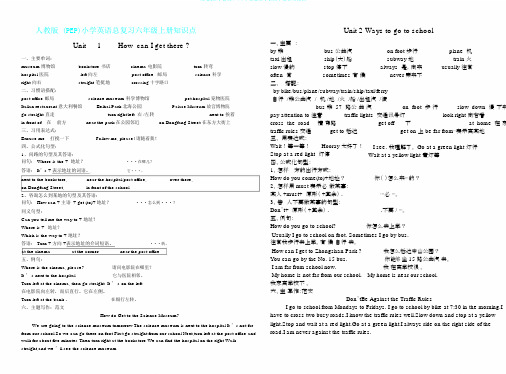
人教版 (PEP)小学英语总复习六年级上册知识点Unit1How can I get there ?一、主要单词:museum 博物馆bookstore 书店cinema 电影院turn 转弯hospital 医院left 向左post office邮局science 科学right 向右straight 笔挺地crossing 十字路口二、习惯语搭配:post office 邮局science museum 科学博物馆pet hospital 宠物医院Italian restaurant 意大利餐馆Beihai Park 北海公园Palace Museum 故宫博物院go straight 直走turn right/left 右 /左转next to 挨着in front of... 在 ...前方near the park 在公园邻近on Dongfang Street 在东方大街上三、习用表达式:Unit 2 Ways to go to school一、主要:by 乘bus 公共汽on foot 步行plane 机taxi 出租ship(大)船subway 地train 火slow 慢的stop 停下always 是,向来usually 往常often 常sometimes 有候never 素来不二、搭配:by bike/bus/plane/subway/train/ship/taxi/ferry自行 /乘公共汽 / 机 /地 /火 /船 /出租汽 /渡bus 乘 57 路公共汽on foot 步行slow down 慢下来pay attention to 注意traffic lights 交通讯号灯look right 向右看cross the road横穿路get off下at home 在家traffic rules 交通get to 抵达get on 上be far from⋯表示离某地Excuse me打搅一下Follow me, please! 请随着我!四、公式化句型:1、问路的句型及其答语:问句: Where is the + 地址?···在哪儿?答语: It’s + 表示地址的词语。
小学六年级英语总复习资料(Word版,27页)
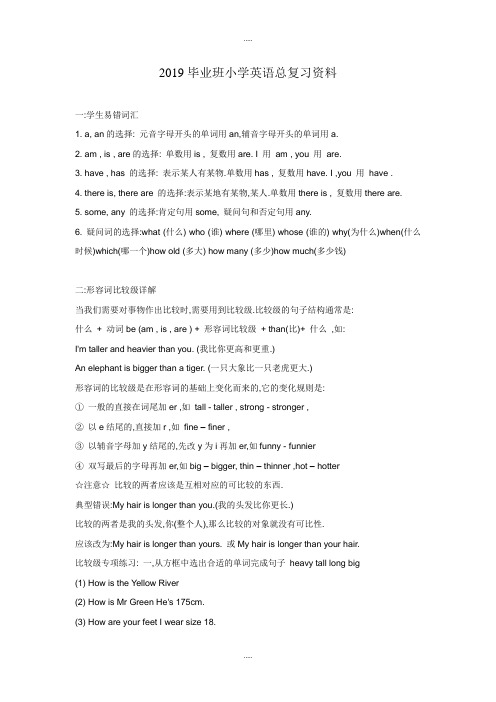
2019毕业班小学英语总复习资料一:学生易错词汇1. a, an的选择: 元音字母开头的单词用an,辅音字母开头的单词用a.2. am , is , are的选择: 单数用is , 复数用are. I 用am , you 用are.3. have , has 的选择: 表示某人有某物.单数用has , 复数用have. I ,you 用have .4. there is, there are 的选择:表示某地有某物,某人.单数用there is , 复数用there are.5. some, any 的选择:肯定句用some, 疑问句和否定句用any.6. 疑问词的选择:what (什么) who (谁) where (哪里) whose (谁的) why(为什么)when(什么时候)which(哪一个)how old (多大) how many (多少)how much(多少钱)二:形容词比较级详解当我们需要对事物作出比较时,需要用到比较级.比较级的句子结构通常是:什么+ 动词be (am , is , are ) + 形容词比较级+ than(比)+ 什么,如:I'm taller and heavier than you. (我比你更高和更重.)An elephant is bigger than a tiger. (一只大象比一只老虎更大.)形容词的比较级是在形容词的基础上变化而来的,它的变化规则是:①一般的直接在词尾加er ,如tall - taller , strong - stronger ,②以e结尾的,直接加r ,如fine – finer ,③以辅音字母加y结尾的,先改y为i再加er,如funny - funnier④双写最后的字母再加er,如big – bigger, thin – thinner ,hot – hotter☆注意☆比较的两者应该是互相对应的可比较的东西.典型错误:My hair is longer than you.(我的头发比你更长.)比较的两者是我的头发,你(整个人),那么比较的对象就没有可比性.应该改为:My hair is longer than yours. 或My hair is longer than your hair.比较级专项练习: 一,从方框中选出合适的单词完成句子heavy tall long big(1) How is the Yellow River(2) How is Mr Green He's 175cm.(3) How are your feet I wear size 18.(4)How is the fish It's 2kg.三:动词过去式详解动词的过去式的构成规则有:A,规则动词①一般直接在动词的后面加ed:如worked , learned , cleaned , visited②以e结尾的动词直接加d:如lived , danced , used③以辅音字母加y结尾的动词要改y为i再加ed(此类动词较少)如study – studied carry –carried worry – worried (注意play,stay不是辅音字母加y,所以不属于此类)④双写最后一个字母(此类动词较少)如stoppedB,不规则动词(此类词并无规则,须熟记)小学阶段要记住以下动词的原形和过去式:sing –sang , eat – ate , see – saw , have – had , do – did , go - went , take - took , buy - bought , get - got , read - read ,fly - flew , am/is - was ,are - were , say - said , leave - left , swim - swam , tell - told , draw - drew , come - came , lose - lost , find - found , drink - drank , hurt - hurt , feel - felt四:动词现在分词详解动词的ing形式的构成规则:①一般的直接在后面加上ing , 如doing , going , working , singing , eating②以e 结尾的动词,要先去e再加ing ,如having , writing③双写最后一个字母的(此类动词极少)有:running , swimming , sitting , getting五:人称代词与物主代词一、人称代词二、物主代词六:句型专项归类1.肯定句:是指用肯定的语气来陈述的句子,如:I'm a student. She is a doctor. He works in a hospital.There are four fans in our classroom. He will eat lunch at 12:00. I watched TV yesterday evening.2,否定句:含有否定词或表示否定意义词的句子,如:I'm not a student. She is not (isn't) a doctor.He does not (doesn't) work in a hospital. There are not (aren't) four fans in our classroom. He will not (won't) eat lunch at 12:00. I did not (didn't) watch TV yesterday evening.☆注意☆小结:否定句主要是在肯定句的基础上加上了否定词"not".有动词be的句子则"not"加在be后面,可缩写成"isn't,aren't",但am not 一般都分开写.没有动词be的句子则要先在主要动词的前面加上一个助动词(do,does,did),然后在它后面加上"not",你也可以把它们缩写在一起如"don't , doesn't , didn't ).这三个助动词要根据人称和时态来选择,其中"does"只用于一般现在时主语是第三人称单数的情况,而"did"只用于一般过去时,不论主语是什么人称和数,都用"did" .3,一般疑问句:是指询问事实的句子,此类句子必须用"yes",或"no"来回答.如:Are you a student Yes, I am / No, I'm not.Is she a doctor Yes, she is. / No, she isn't.Does he work in a hospital Yes, he does. / No, he doesn't.Are there four fans in our classroom Yes, there are. / No, there aren't.Are you going to buy a comic book tonight Yes, I am. / No, I am not. (Yes, we are. / No, we aren't.)Will he eat lunch at 12:00 Yes, I will. / No, I will not(won't).Are they swimming Yes, they are. / No, they aren't.Did you watch TV yesterday evening Yes, I did. / No, I didn't.☆注意☆小结:一般疑问句是在肯定句的基础上,①把动词be调到首位,其他照写,末尾标点符号变成问号即可.②没有动词be的句子则要在句首加上一个助动词(do,does,did)再把紧跟在后面的动词变回原形,末尾标点符号变成问号即可.这三个助动词也要根据人称和时态来选择,其中"does"只用于一般现在时主语是第三人称单数的情况,而"did"只用于一般过去时,不论主语是什么人称和数,都用"did" .一般疑问句有个重要的原则就是问和答要一致,即问句里的第一个单词(助动词)和简略答句里的这个词是一致的.4,特殊疑问句:以特殊疑问词(what , where , who , which , when , whose , why , how等)开头引导的句子.此类句子应该问什么就答什么,不能用"yes ,no"来回答.如:What is this It's a computer.What does he do He's a doctor.Where are you going I'm going to Beijing.Who played football with you yesterday afternoon Mike.Which season do you like best Summer.When do you usually get up I usually get up at 6:30.Whose skirt is this It's Amy's.Why do you like spring best Because I can plant trees.How are you I'm fine. / I'm happy.How did you go to Xinjiang I went to Xinjiang by train.☆其中how又可以和其他一些形容词连用组成特殊疑问词组用来提问,如: how many(多少(数量)), how much(多少(钱)), how tall(多高), how long(多长), how big(多大), how heavy(多重)例句:How many pencils do you have I have three pencils.How many girls can you see I can see four girls.How many desks are there in your classroom There are 51.☆小结:how many 用来提问可数名词的数量,主要有以上三种句式搭配,How many + 名词复数+ do you have 你有多少……How many + 名词复数+ can you see 你能看见多少……How many + 名词复数+ are there… 有多少……七:完全,缩略形式: I'm=I am he's=he is she's=she is they're=they are you're=you are there's=there is they're=they are can't=can not don't=do not doesn't=does not isn't=is not aren't=are not let's=let us won't=will not I'll=I will wasn't=was not总结:通常情况下,'m即am,'s即is(但let's=let us), 're即are ,n't即not (但can't=can not)八:小学英语词汇不完全归类表学习用品(school things):pen钢笔pencil铅笔pencil-case铅笔盒ruler尺子book书bag 包comic book漫画书post card明信片newspaper报纸schoolbag书包eraser橡皮crayon蜡笔sharpener卷笔刀story-book故事书notebook笔记本Chinese book语文书English book英语书math book数学书magazine杂志dictionary词典人体(body):foot脚head头face脸hair头发nose鼻子mouth嘴eye眼睛ear耳朵arm 手臂hand手finger手指leg腿tail尾巴颜色(colours):red红blue蓝yellow黄green绿white白black黑pink粉红purple紫orange橙brown棕动物(animals):cat猫dog狗pig猪duck鸭rabbit兔horse马elephant大象ant蚂蚁fish鱼bird鸟eagle鹰beaver海狸snake蛇mouse老鼠squirrel松鼠kangaroo袋鼠monkey猴panda熊猫bear熊lion狮子tiger老虎fox狐狸zebra斑马deer鹿giraffe 长颈鹿goose鹅hen母鸡turkey火鸡lamb小羊sheep绵羊goat山羊cow奶牛donkey驴squid鱿鱼lobster龙虾shark鲨鱼seal海豹sperm whale抹香鲸killer whale 虎鲸人物(people):friend朋友boy男孩girl女孩mother母亲father父亲sister姐妹brother 兄弟uncle叔叔;舅舅man男人woman女人Mr.先生Miss小姐lady女士;小姐mom妈妈dad爸爸parents父母grandparents祖父母grandma/grandmother(外)祖母grandpa/grandfather(外)祖父aunt姑姑cousin堂(表)兄弟;堂(表)姐妹son儿子daughter 女儿baby婴儿kid小孩classmate同学queen女王visitor参观者neighbour邻居principal校长university student大学生pen pal笔友tourist旅行者people人物robot机器人职业(jobs):teacher教师student学生doctor医生nurse护士driver司机farmer农民singer歌唱家writer作家actor男演员actress女演员artist画家TV reporter电视台记者engineer工程师accountant会计policeman(男)警察salesperson销售员cleaner清洁工baseball player棒球运动员assistant售货员police警察食品,饮料(food & drink):rice米饭bread面包beef牛肉milk牛奶water水egg蛋fish鱼tofu豆腐cake蛋糕hot dog热狗hamburger汉堡包French fries炸薯条cookie曲奇biscuit饼干jam果酱noodles面条meat肉chicken鸡肉pork猪肉mutton羊肉vegetable蔬菜salad沙拉soup汤ice冰ice-cream冰淇淋Coke可乐juice果汁tea茶coffee咖啡breakfast早餐lunch午餐dinner/supper晚餐meal一餐水果,蔬菜(fruit & vegetables):apple苹果banana香蕉pear梨orange橙watermelon西瓜grape葡萄eggplant茄子green beans青豆tomato西红柿potato土豆peach桃strawberry草莓cucumber黄瓜onion洋葱carrot胡萝卜cabbage卷心菜衣服(clothes):jacket夹克衫shirt衬衫T-shirt丅恤衫skirt短裙子dress连衣裙jeans牛仔裤pants长裤socks袜子shoes鞋子sweater毛衣coat上衣raincoat雨衣shorts短裤sneakers网球鞋slippers拖鞋sandals凉鞋boots靴子hat(有沿的)帽子cap便帽sunglasses太阳镜tie领带scarf围巾gloves手套trousers裤子cloth布交通工具(vehicles):bike自行车bus公共汽车train火车boat小船ship轮船yacht快艇car小汽车taxi出租车jeep吉普车van小货车;面包车plane/airplane飞机subway/underground地铁motor cycle摩托车杂物(other things): window窗户door门desk课桌chair椅子bed床computer计算机board写字板fan风扇light灯teacher's desk讲台picture图画;照片wall墙壁floor地板curtain窗帘trash bin垃圾箱closet壁橱mirror镜子end table床头柜football/soccer足球present礼物walkman随身听lamp台灯phone电话sofa沙发shelf书架fridge冰箱table桌子TV电视air-conditioner空调key钥匙lock锁photo照片chart图表plate盘子knife刀fork叉spoon勺子chopsticks筷子pot锅gift礼物toy玩具doll洋娃娃ball 球balloon气球kite风筝jigsaw puzzle拼图游戏box盒子umbrella伞zipper拉链violin 小提琴yo-yo溜溜球nest鸟窝hole洞tube管子toothbrush牙刷menu菜单e-card电子卡片e-mail电子邮件traffic light交通灯money钱medicine药地点(locations):home家room房间bedroom卧室bathroom卫生间living room起居室kitchen厨房classroom教室school学校park公园library图书馆post office邮局police office警察局hospital医院cinema电影院bookstore书店farm农场zoo动物园garden 花园study书房playground操场canteen食堂teacher's office教师办公室library图书馆gym体育馆washroom卫生间art room绘画教室computer room计算机教室music room 音乐教室TV room电视机房flat公寓company公司factory工厂fruit stand水果摊pet shop宠物商店nature park自然公园theme park主题公园science museum科学博物馆the Great Wall长城supermarket超市bank银行country国家village乡村city城市hometown家乡bus stop公交车站课程(classes): sports体育运动science科学Moral Education思想品德课Social Studies 社会课Chinese语文math数学PE体育课English英语课国家,城市(countries & cities): China/PRC中国America/USA美国UK联合王国England 英国Canada/CAN加拿大Australia澳大利亚New York纽约London伦敦Sydney悉尼Moscow莫斯科Cairo开罗气象(weather): cold寒冷的warm温暖的cool凉爽的snowy下雪的sunny晴朗的hot炎热的rainy下雨的windy有风的cloudy多云的weather report天气预报景物(nature): river河流lake湖泊stream河;溪forest森林path小道road公路house 房子bridge桥building建筑物rain雨cloud云sun太阳mountain山sky天空rainbow 彩虹wind风air空气moon月亮植物(plants): flower花grass草tree树seed种子sprout苗plant植物rose玫瑰leaf 叶子星期(week): Monday星期一Tuesday星期二Wednesday星期三Thursday星期四Friday星期五Saturday星期六Sunday星期天weekend周末月份(months): Jan. (January)一月Feb.(February)二月Mar.(March)三月April四月May 五月June六月July七月Aug.(August)八月Sept.(September)九月Oct.(October)十月Nov.(November)十一月Dec.(December)十二月季节(seasons): spring春summer夏fall/autumn秋winter冬方位(directions): south南north北east东west西left 左边right右边患病(illness): have a fever发烧hurt疼痛have a cold感冒have a toothache牙疼have a headache头疼have a sore throat喉咙疼数词(numbers): one一two二three三four四five五six六seven七eight八nine九ten十eleven十一twelve十二thirteen十三fourteen十四fifteen十五sixteen十六seventeen十七eighteen十八nineteen十九twenty二十thirty三十forty四十fifty五十sixty六十seventy七十eighty八十ninety九十forty-two四十二hundred百one/a hundred and thirty-six一百三十六first第一second第二third第三fourth第四fifth第五eighth第八ninth第九twelfth第十二twentieth第二十thirtieth第三十fortieth第四十fiftieth第五十sixtieth第六十seventieth第七十eightieth第八十ninetieth第九十fifty-sixth第五十六形容词(adj.): big大的small小的long长的tall高的short短的;矮的young年轻的old 旧的;老的strong健壮的thin瘦的active积极活跃的quiet安静的nice好看的kind和蔼亲切的strict严格的smart聪明的funny滑稽可笑的tasty好吃的sweet甜的salty咸的sour酸的fresh新鲜的favourite最喜爱的clean干净的tired疲劳的excited兴奋的angry生气的happy高兴的bored无聊的sad忧愁的taller更高的shorter更矮的stronger更强壮的older年龄更大的younger更年轻的bigger更大的heavier更重的longer更长的thinner更瘦的smaller更小的good好的fine好的great很好的heavy 重的new新的fat胖的happy快乐的right对的hungry饥饿的cute逗人喜爱的little小的lovely可爱的beautiful漂亮的colourful色彩鲜艳的pretty漂亮的cheap便宜的expensive昂贵的juicy多汁的tender嫩的healthy健康的ill有病的helpful有帮助的high高的easy简单的proud骄傲的sick有病的better更好的higher更高的介词(prep.): in在……里on在……上;在……时候under在……下面near在……的旁边behind在……后边next to与……相邻over在……上面in front of在……前面代词(pron.): I我we我们you你;你们he他she她it它they他(她,它)们my我的our 我们的your你的;你们的his他的her她的动词(v.):play(.ed)玩;踢swim(swam)游泳skate滑冰fly(flew)飞jump跳walk走run(ran)跑climb爬fight(fought)打架swing(swung)荡eat(ate)吃sleep(slept)睡觉like像,喜欢have(had)有;吃turn转弯buy(bought)买take(took)买;带live居住teach(taught)教go(went)去study(studied)学习learn学习sing(sang)唱歌dance跳舞row划do(did)做do homework做作业do housework做家务watch TV看电视read(read) books读书cook the meals做饭water the flowers浇花sweep(swept) the floor扫地clean the bedroom打扫卧室make(made) the bed铺床set(set) the table摆饭桌wash the clothes洗衣服do the dishes洗碗碟use a computer使用计算机do morning exercises晨练;做广播操eat breakfast吃早饭eat dinner吃晚饭go to school上学have English class上英语课play sports进行体育运动get(got)up起床climb mountains爬山go shopping买东西play the piano弹钢琴visit grandparents看望(外)祖父母go hiking去远足fly kites放风筝make a snowman堆雪人plant trees种树draw(drew) pictures画画cook dinner做饭read a book 看书answer the phone接电话listen to music听音乐clean the room打扫房间write(wrote) a letter写信write an e-mail写电子邮件drink(drank) water喝水take pictures 照相watch insects观察昆虫pick up leaves采摘树叶do an experiment做实验catch butterflies捉蝴蝶count insects数昆虫collect insects收集昆虫collect leaves收集树叶write a report写报告play chess下棋have a picnic举行野餐get to到达ride(rode) a bike 骑自行车play the violin拉小提琴make kites制作风筝collect stamps集邮meet(met)见面welcome欢迎thank谢谢love爱work工作drink(drank)喝taste尝smell闻feed(fed)喂养shear剪milk挤奶look看guess猜help帮助pass传递show展示use 使用clean打扫open打开close关上put放paint绘画tell(told)告诉kick踢bounce反弹ride(rode)骑stop(stopped)停wait等find(found)寻找到drive(drove)驾驶fold折send(sent)寄wash洗shine照耀become变成feel(felt)感觉到think(thought)思考meet(met)遇见fall(fell)落下leave(left)离开wake(woke) up醒来put on穿上take off脱掉hang up挂起wear(wore)穿go home回家go to bed上床睡觉play computer games 玩电脑游戏play chess下棋empty the trash倒垃圾put away the clothes收拾衣服get off下车take a trip去旅行read a magazine读杂志go to the cinema去看电影go straight 向前直走2009毕业班小学英语总复习资料一:学生易错词汇1. a, an的选择: 元音字母开头的单词用an,辅音字母开头的单词用a.2. am , is , are的选择: 单数用is , 复数用are. I 用am , you 用are.3. have , has 的选择: 表示某人有某物.单数用has , 复数用have. I ,you 用have .4. there is, there are 的选择:表示某地有某物,某人.单数用there is , 复数用there are.5. some, any 的选择:肯定句用some, 疑问句和否定句用any.6. 疑问词的选择:what (什么) who (谁) where (哪里) whose (谁的) why(为什么)when(什么时候)which(哪一个)how old (多大) how many (多少)how much(多少钱)二:形容词比较级详解当我们需要对事物作出比较时,需要用到比较级.比较级的句子结构通常是:什么+ 动词be (am , is , are ) + 形容词比较级+ than(比)+ 什么,如:I'm taller and heavier than you. (我比你更高和更重.)An elephant is bigger than a tiger. (一只大象比一只老虎更大.)形容词的比较级是在形容词的基础上变化而来的,它的变化规则是:①一般的直接在词尾加er ,如tall - taller , strong - stronger ,②以e结尾的,直接加r ,如fine – finer ,③以辅音字母加y结尾的,先改y为i再加er,如funny - funnier④双写最后的字母再加er,如big – bigger, thin – thinner ,hot – hotter☆注意☆比较的两者应该是互相对应的可比较的东西.典型错误:My hair is longer than you.(我的头发比你更长.)比较的两者是我的头发,你(整个人),那么比较的对象就没有可比性.应该改为:My hair is longer than yours. 或My hair is longer than your hair.比较级专项练习: 一,从方框中选出合适的单词完成句子heavy tall long big(1) How is the Yellow River(2) How is Mr Green He's 175cm.(3) How are your feet I wear size 18.(4)How is the fish It's 2kg.三:动词过去式详解动词的过去式的构成规则有:A,规则动词①一般直接在动词的后面加ed:如worked , learned , cleaned , visited②以e结尾的动词直接加d:如lived , danced , used③以辅音字母加y结尾的动词要改y为i再加ed(此类动词较少)如study – studied carry –carried worry – worried (注意play,stay不是辅音字母加y,所以不属于此类)④双写最后一个字母(此类动词较少)如stoppedB,不规则动词(此类词并无规则,须熟记)小学阶段要记住以下动词的原形和过去式:sing –sang , eat – ate , see – saw , have – had , do – did , go - went , take - took , buy - bought , get - got , read - read ,fly - flew , am/is - was ,are - were , say - said , leave - left , swim - swam , tell - told , draw - drew , come - came , lose - lost , find - found , drink - drank , hurt - hurt , feel - felt四:动词现在分词详解动词的ing形式的构成规则:①一般的直接在后面加上ing , 如doing , going , working , singing , eating②以e 结尾的动词,要先去e再加ing ,如having , writing③双写最后一个字母的(此类动词极少)有:running , swimming , sitting , getting五:人称代词与物主代词一、人称代词二、物主代词六:句型专项归类1.肯定句:是指用肯定的语气来陈述的句子,如:I'm a student. She is a doctor. He works in a hospital.There are four fans in our classroom. He will eat lunch at 12:00. I watched TV yesterday evening.2,否定句:含有否定词或表示否定意义词的句子,如:I'm not a student. She is not (isn't) a doctor.He does not (doesn't) work in a hospital. There are not (aren't) four fans in our classroom. He will not (won't) eat lunch at 12:00. I did not (didn't) watch TV yesterday evening.☆注意☆小结:否定句主要是在肯定句的基础上加上了否定词"not".有动词be的句子则"not"加在be后面,可缩写成"isn't,aren't",但am not 一般都分开写.没有动词be的句子则要先在主要动词的前面加上一个助动词(do,does,did),然后在它后面加上"not",你也可以把它们缩写在一起如"don't , doesn't , didn't ).这三个助动词要根据人称和时态来选择,其中"does"只用于一般现在时主语是第三人称单数的情况,而"did"只用于一般过去时,不论主语是什么人称和数,都用"did" .3,一般疑问句:是指询问事实的句子,此类句子必须用"yes",或"no"来回答.如:Are you a student Yes, I am / No, I'm not.Is she a doctor Yes, she is. / No, she isn't.Does he work in a hospital Yes, he does. / No, he doesn't.Are there four fans in our classroom Yes, there are. / No, there aren't.Are you going to buy a comic book tonight Yes, I am. / No, I am not. (Yes, we are. / No, we aren't.)Will he eat lunch at 12:00 Yes, I will. / No, I will not(won't).Are they swimming Yes, they are. / No, they aren't.Did you watch TV yesterday evening Yes, I did. / No, I didn't.☆注意☆小结:一般疑问句是在肯定句的基础上,①把动词be调到首位,其他照写,末尾标点符号变成问号即可.②没有动词be的句子则要在句首加上一个助动词(do,does,did)再把紧跟在后面的动词变回原形,末尾标点符号变成问号即可.这三个助动词也要根据人称和时态来选择,其中"does"只用于一般现在时主语是第三人称单数的情况,而"did"只用于一般过去时,不论主语是什么人称和数,都用"did" .一般疑问句有个重要的原则就是问和答要一致,即问句里的第一个单词(助动词)和简略答句里的这个词是一致的.4,特殊疑问句:以特殊疑问词(what , where , who , which , when , whose , why , how等)开头引导的句子.此类句子应该问什么就答什么,不能用"yes ,no"来回答.如:What is this It's a computer.What does he do He's a doctor.Where are you going I'm going to Beijing.Who played football with you yesterday afternoon Mike.Which season do you like best Summer.When do you usually get up I usually get up at 6:30.Whose skirt is this It's Amy's.Why do you like spring best Because I can plant trees.How are you I'm fine. / I'm happy.How did you go to Xinjiang I went to Xinjiang by train.☆其中how又可以和其他一些形容词连用组成特殊疑问词组用来提问,如: how many(多少(数量)), how much(多少(钱)), how tall(多高), how long(多长), how big(多大), how heavy(多重)例句:How many pencils do you have I have three pencils.How many girls can you see I can see four girls.How many desks are there in your classroom There are 51.☆小结:how many 用来提问可数名词的数量,主要有以上三种句式搭配,How many + 名词复数+ do you have 你有多少……How many + 名词复数+ can you see 你能看见多少……How many + 名词复数+ are there… 有多少……七:完全,缩略形式: I'm=I am he's=he is she's=she is they're=they are you're=you are there's=there is they're=they are can't=can not don't=do not doesn't=does not isn't=is not aren't=are not let's=let us won't=will not I'll=I will wasn't=was not总结:通常情况下,'m即am,'s即is(但let's=let us), 're即are ,n't即not (但can't=can not)八:小学英语词汇不完全归类表学习用品(school things):pen钢笔pencil铅笔pencil-case铅笔盒ruler尺子book书bag 包comic book漫画书post card明信片newspaper报纸schoolbag书包eraser橡皮crayon蜡笔sharpener卷笔刀story-book故事书notebook笔记本Chinese book语文书English book英语书math book数学书magazine杂志dictionary词典人体(body):foot脚head头face脸hair头发nose鼻子mouth嘴eye眼睛ear耳朵arm 手臂hand手finger手指leg腿tail尾巴颜色(colours):red红blue蓝yellow黄green绿white白black黑pink粉红purple紫orange橙brown棕动物(animals):cat猫dog狗pig猪duck鸭rabbit兔horse马elephant大象ant蚂蚁fish鱼bird鸟eagle鹰beaver海狸snake蛇mouse老鼠squirrel松鼠kangaroo袋鼠monkey猴panda熊猫bear熊lion狮子tiger老虎fox狐狸zebra斑马deer鹿giraffe 长颈鹿goose鹅hen母鸡turkey火鸡lamb小羊sheep绵羊goat山羊cow奶牛donkey驴squid鱿鱼lobster龙虾shark鲨鱼seal海豹sperm whale抹香鲸killer whale 虎鲸人物(people):friend朋友boy男孩girl女孩mother母亲father父亲sister姐妹brother 兄弟uncle叔叔;舅舅man男人woman女人Mr.先生Miss小姐lady女士;小姐mom妈妈dad爸爸parents父母grandparents祖父母grandma/grandmother(外)祖母grandpa/grandfather(外)祖父aunt姑姑cousin堂(表)兄弟;堂(表)姐妹son儿子daughter 女儿baby婴儿kid小孩classmate同学queen女王visitor参观者neighbour邻居principal校长university student大学生pen pal笔友tourist旅行者people人物robot机器人职业(jobs):teacher教师student学生doctor医生nurse护士driver司机farmer农民singer歌唱家writer作家actor男演员actress女演员artist画家TV reporter电视台记者engineer工程师accountant会计policeman(男)警察salesperson销售员cleaner清洁工baseball player棒球运动员assistant售货员police警察食品,饮料(food & drink):rice米饭bread面包beef牛肉milk牛奶water水egg蛋fish鱼tofu豆腐cake蛋糕hot dog热狗hamburger汉堡包French fries炸薯条cookie曲奇biscuit饼干jam果酱noodles面条meat肉chicken鸡肉pork猪肉mutton羊肉vegetable蔬菜salad沙拉soup汤ice冰ice-cream冰淇淋Coke可乐juice果汁tea茶coffee咖啡breakfast早餐lunch午餐dinner/supper晚餐meal一餐水果,蔬菜(fruit & vegetables):apple苹果banana香蕉pear梨orange橙watermelon西瓜grape葡萄eggplant茄子green beans青豆tomato西红柿potato土豆peach桃strawberry草莓cucumber黄瓜onion洋葱carrot胡萝卜cabbage卷心菜衣服(clothes):jacket夹克衫shirt衬衫T-shirt丅恤衫skirt短裙子dress连衣裙jeans牛仔裤pants长裤socks袜子shoes鞋子sweater毛衣coat上衣raincoat雨衣shorts短裤sneakers网球鞋slippers拖鞋sandals凉鞋boots靴子hat(有沿的)帽子cap便帽sunglasses太阳镜tie领带scarf围巾gloves手套trousers裤子cloth布交通工具(vehicles):bike自行车bus公共汽车train火车boat小船ship轮船yacht快艇car小汽车taxi出租车jeep吉普车van小货车;面包车plane/airplane飞机subway/underground地铁motor cycle摩托车杂物(other things): window窗户door门desk课桌chair椅子bed床computer计算机board写字板fan风扇light灯teacher's desk讲台picture图画;照片wall墙壁floor地板curtain窗帘trash bin垃圾箱closet壁橱mirror镜子end table床头柜football/soccer足球present礼物walkman随身听lamp台灯phone电话sofa沙发shelf书架fridge冰箱table桌子TV电视air-conditioner空调key钥匙lock锁photo照片chart图表plate盘子knife刀fork叉spoon勺子chopsticks筷子pot锅gift礼物toy玩具doll洋娃娃ball 球balloon气球kite风筝jigsaw puzzle拼图游戏box盒子umbrella伞zipper拉链violin 小提琴yo-yo溜溜球nest鸟窝hole洞tube管子toothbrush牙刷menu菜单e-card电子卡片e-mail电子邮件traffic light交通灯money钱medicine药地点(locations):home家room房间bedroom卧室bathroom卫生间living room起居室kitchen厨房classroom教室school学校park公园library图书馆post office邮局police office警察局hospital医院cinema电影院bookstore书店farm农场zoo动物园garden 花园study书房playground操场canteen食堂teacher's office教师办公室library图书馆gym体育馆washroom卫生间art room绘画教室computer room计算机教室music room 音乐教室TV room电视机房flat公寓company公司factory工厂fruit stand水果摊pet shop宠物商店nature park自然公园theme park主题公园science museum科学博物馆the Great Wall长城supermarket超市bank银行country国家village乡村city城市hometown家乡bus stop公交车站课程(classes): sports体育运动science科学Moral Education思想品德课Social Studies 社会课Chinese语文math数学PE体育课English英语课国家,城市(countries & cities): China/PRC中国America/USA美国UK联合王国England 英国Canada/CAN加拿大Australia澳大利亚New York纽约London伦敦Sydney悉尼Moscow莫斯科Cairo开罗气象(weather): cold寒冷的warm温暖的cool凉爽的snowy下雪的sunny晴朗的hot炎热的rainy下雨的windy有风的cloudy多云的weather report天气预报景物(nature): river河流lake湖泊stream河;溪forest森林path小道road公路house 房子bridge桥building建筑物rain雨cloud云sun太阳mountain山sky天空rainbow 彩虹wind风air空气moon月亮植物(plants): flower花grass草tree树seed种子sprout苗plant植物rose玫瑰leaf 叶子星期(week): Monday星期一Tuesday星期二Wednesday星期三Thursday星期四Friday星期五Saturday星期六Sunday星期天weekend周末月份(months): Jan. (January)一月Feb.(February)二月Mar.(March)三月April四月May 五月June六月July七月Aug.(August)八月Sept.(September)九月Oct.(October)十月Nov.(November)十一月Dec.(December)十二月季节(seasons): spring春summer夏fall/autumn秋winter冬方位(directions): south南north北east东west西left 左边right右边患病(illness): have a fever发烧hurt疼痛have a cold感冒have a toothache牙疼have a headache头疼have a sore throat喉咙疼数词(numbers): one一two二three三four四five五six六seven七eight八nine九ten十eleven十一twelve十二thirteen十三fourteen十四fifteen十五sixteen十六seventeen十七eighteen十八nineteen十九twenty二十thirty三十forty四十fifty五十sixty六十seventy七十eighty八十ninety九十forty-two四十二hundred百one/a hundred and thirty-six一百三十六first第一second第二third第三fourth第四fifth第五eighth第八ninth第九twelfth第十二twentieth第二十thirtieth第三十fortieth第四十fiftieth第五十sixtieth第六十seventieth第七十eightieth第八十ninetieth第九十fifty-sixth第五十六形容词(adj.): big大的small小的long长的tall高的short短的;矮的young年轻的old 旧的;老的strong健壮的thin瘦的active积极活跃的quiet安静的nice好看的kind和蔼亲切的strict严格的smart聪明的funny滑稽可笑的tasty好吃的sweet甜的salty咸的sour酸的fresh新鲜的favourite最喜爱的clean干净的tired疲劳的excited兴奋的angry生气的happy高兴的bored无聊的sad忧愁的taller更高的shorter更矮的stronger更强壮的older年龄更大的younger更年轻的bigger更大的heavier更重的longer更长的thinner更瘦的smaller更小的good好的fine好的great很好的heavy 重的new新的fat胖的happy快乐的right对的hungry饥饿的cute逗人喜爱的little小的lovely可爱的beautiful漂亮的colourful色彩鲜艳的pretty漂亮的cheap便宜的expensive昂贵的juicy多汁的tender嫩的healthy健康的ill有病的helpful有帮助的high高的easy简单的proud骄傲的sick有病的better更好的higher更高的介词(prep.): in在……里on在……上;在……时候under在……下面near在……的旁边behind在……后边next to与……相邻over在……上面in front of在……前面代词(pron.): I我we我们you你;你们he他she她it它they他(她,它)们my我的our 我们的your你的;你们的his他的her她的动词(v.):play(.ed)玩;踢swim(swam)游泳skate滑冰fly(flew)飞jump跳walk走run(ran)跑climb爬fight(fought)打架swing(swung)荡eat(ate)吃sleep(slept)睡觉like像,喜欢have(had)有;吃turn转弯buy(bought)买take(took)买;带live居住teach(taught)教go(went)去study(studied)学习learn学习sing(sang)唱歌dance跳舞row划do(did)做do homework做作业do housework做家务watch TV看电视read(read) books读书cook the meals做饭water the flowers浇花sweep(swept) the floor扫地clean the bedroom打扫卧室make(made) the bed铺床set(set) the table摆饭桌wash the clothes洗衣服do the dishes洗碗碟use a computer使用计算机do morning exercises晨练;做广播操eat breakfast吃早饭eat dinner吃晚饭go to school上学have English class上英语课play sports进行体育运动get(got)up起床climb mountains爬山go shopping买东西play thepiano弹钢琴visit grandparents看望(外)祖父母go hiking去远足fly kites放风筝make a snowman堆雪人plant trees种树draw(drew) pictures画画cook dinner做饭read a book 看书answer the phone接电话listen to music听音乐clean the room打扫房间write(wrote) a letter写信write an e-mail写电子邮件drink(drank) water喝水take pictures 照相watch insects观察昆虫pick up leaves采摘树叶do an experiment做实验catch butterflies捉蝴蝶count insects数昆虫collect insects收集昆虫collect leaves收集树叶write a report写报告play chess下棋have a picnic举行野餐get to到达ride(rode) a bike 骑自行车play the violin拉小提琴make kites制作风筝collect stamps集邮meet(met)见面welcome欢迎thank谢谢love爱work工作drink(drank)喝taste尝smell闻feed(fed)喂养shear剪milk挤奶look看guess猜help帮助pass传递show展示use 使用clean打扫open打开close关上put放paint绘画tell(told)告诉kick踢bounce反弹ride(rode)骑stop(stopped)停wait等find(found)寻找到drive(drove)驾驶fold折send(sent)寄wash洗shine照耀become变成feel(felt)感觉到think(thought)思考meet(met)遇见fall(fell)落下leave(left)离开wake(woke) up醒来put on穿上take off脱掉hang up挂起wear(wore)穿go home回家go to bed上床睡觉play computer games 玩电脑游戏play chess下棋empty the trash倒垃圾put away the clothes收拾衣服get off下车take a trip去旅行read a magazine读杂志go to the cinema去看电影go straight 向前直走2009毕业班小学英语总复习资料一:学生易错词汇1. a, an的选择: 元音字母开头的单词用an,辅音字母开头的单词用a.2. am , is , are的选择: 单数用is , 复数用are. I 用am , you 用are.3. have , has 的选择: 表示某人有某物.单数用has , 复数用have. I ,you 用have .4. there is, there are 的选择:表示某地有某物,某人.单数用there is , 复数用there are.5. some, any 的选择:肯定句用some, 疑问句和否定句用any.6. 疑问词的选择:what (什么) who (谁) where (哪里) whose (谁的) why(为什么)when(什么。
(整理)小学六年级英语全套复习资料

英语复习资料教师版·复习资料(讲义·答案)·试卷分析(答案·分析)·学生资料(资料·卡表)小学六年级英语复习资料目录-------------第一部分复习资料1、一般过去时(讲义)............................................................................................................................................P1(答案)............................................................................................................................................P32、一般现在时(讲义)............................................................................................................................................P7(答案)............................................................................................................................................P93、一般将来时(讲义)............................................................................................................................................P17(答案)............................................................................................................................................P194、现在进行时(讲义)............................................................................................................................................P23(答案)............................................................................................................................................P255、There be (讲义)............................................................................................................................................P27(答案)............................................................................................................................................P296、情态动词(讲义)............................................................................................................................................P33(答案)............................................................................................................................................P357、时态对比(讲义)............................................................................................................................................P37(答案)............................................................................................................................................P418、比较级(讲义)............................................................................................................................................P49(答案)............................................................................................................................................P519、be 和do (讲义)............................................................................................................................................P53(答案)............................................................................................................................................P5710、人称和数(讲义)............................................................................................................................................P59(答案)............................................................................................................................................P6111、单词短语(答案)............................................................................................................................................P6512、教材知识整理............................................................................................................................................................P6913、英语作文(答案)............................................................................................................................................P7714、其他............................................................................................................................................................................P81 第二部分试卷分析1、期中检测试卷T2(答案)........................................................................................................................................P832、单元检测试卷R1(答案)........................................................................................................................................P87(分析)........................................................................................................................................P913、单元检测试卷R2(答案)........................................................................................................................................P93(分析)........................................................................................................................................P974、第一次模拟试卷(答案)........................................................................................................................................P99(分析)........................................................................................................................................P1035、第二次模拟试卷(答案)........................................................................................................................................P105(分析)........................................................................................................................................P1096、第三次模拟试卷(答案)........................................................................................................................................P111(分析)........................................................................................................................................P115第三部分学生资料1、学生读背句型............................................................................................................................................................P1172、学生错题卡................................................................................................................................................................P1213、学生单词错漏卡........................................................................................................................................................P123-------------一般过去时1 概念 表示过去某个时间里存在的状态 表示过去发生的事情和动作2 特征 was,were,would 等 yesterday,last week,last month,just now,...ago 等3 结构 be 动词:主语+be(was,were)+其它 行为动词:主语+行为动词(过去式)+其它4 例句 She was at home yesterday evening . He did his homework last night .be 动词(was,were) 行为动词(过去式) 1 肯定句 I was at home yesterday . I visited my uncle yesterday .He was excited yesterday evening .He did his homework last night . It was Ben ’s birthday last Friday . He worked in Shanghai ten years ago . We were busy just now . We went to zoo yesterday . They were in the gym just now . They played football yesterday .2 否定句 He was not in the park yesterday .He didn ’t do his home work last night . She wasn ’t at home yesterday evening . They didn ’t play football yesterday . We weren ’t busy just now . They didn ’t swim in the lake yesterday .3 特殊疑问句 Where was he born?Where did he go yesterday ? He went to Kunming . Who was at the zoo yesterday ?Who climbed mountains last weekend ? Tom climbed mountains. What day was it yesterday ? What did you do last night ? I went swimming. How was your school trip? How did you go to school this morning ? We went by plane . When was he born? When did you finish your homework? I finished it at 7 o ’clock.4 一般疑问句 Was he a pupil five years ago ? Yes ,he was . / No, he wasn ’t . Did he do his homework last night ? Yes, he did . / No, he didn ’t . He did his homework last night . Was she at home yesterday evening ? Yes ,she was . / No, she wasn ’t . Did John play computer games last night ? Yes, he did . / No, he didn ’t . John played computer games last night . Were they in Li Yan ’s home last night ? Yes ,they were . / No, they weren ’t . Did they play football yesterday ? Yes, they did . / No, they didn ’t . They played football yesterday . Were you busy just now ?Yes, I was . / No, I was n’t . Did you study English in 1990? Yes, I did . / No, I didn ’t . I studied English in 1990. Were you born in Shanghai? Yes, I was . / No, I was n’t . Did you read books yesterday ? Yes, I did . / No, I didn ’t .I read books yesterday. 否定句、特殊疑问句、一般疑问句some 改为any, and 改为or ,第一二人称互换注意1一般现在时常有标志词:yesterday,last week,just now,...ago 等 I got up at 6:00 yesterday .He played football last week . 2 前面使用助动词did, didn ’t, would, wouldn ’t 等,后面动词用原形 He didn ’t want to go shopping yesterday . What would you like for lunch?4 动词过去式没有人称变化 I visited my uncle yesterday . He visited my uncle yesterday .5 看准时态,区别现在进行时等 Tom sang a song just now. Tom is singing a song now .6 注意结构,避免漏掉动词What did he do last weekend?She went hiking last holiday. 7 注意原形,否定、疑问第二个动词 He didn ’t go to school by bike yesterday . Where did he go yesterday ?8 同一个主语第二个动词沿用形式 Tom got up at six and went to school at seven yesterday .He read books and wrote letters yesterday evening . 9 否定句、特殊疑问句、一般疑问句一二人称互换,some 改any, and 改or动词过去式变化1 一般情况 加“ed ” watch-watch ed look-look ed play-play ed2 不发音e 结尾 加“d ” like-like d live-live d use-use d3 辅音字母加y 结尾,改y 为i 加"ed " study-stud ied try-tr ied worry-worr ied *fly-fl ied /fl ew元音(a,e,i,o,u )字母加y 结尾看情况 stay-stay ed play-play ed*s ay -s aid buy-b ought 4 重读闭音节/r 双写末尾字母加“ed ” stop-stop ped plan-plan ned prefer-prefer red 即辅音+元音+辅音 5 不规则am/is-was eat-ate do-did see-saw go-went------------- 教材重现1 Book8 Unit3&4 What did you do last weekend ?I played football. 2 Did you help them clean their room? Yes, I did . 3What did you do yesterday ? I went fishing. 4 Did you read books?Yes, I did . 5 Did you clean your room?No, I didn’t .6 Where did you go on your holiday ? I went to Xinjiang.7 What did you do there? I sang and danced with my new friends. 8How did you go there?I went by train. 1 Book3 Unit5 What would you like for lunch? I ’d like some… 2 1 Book5 Unit3 2answer ed ask ed brush edcatch ed clean ed climb ed collect ed cook ed count ed finish ed fish ed guess ed help ed join ed jump ed kick ed learn ed listen ed look ed open ed pass ed perform ed plant ed reach ed row ed show ed snow ed talk ed touch ed turn ed visit ed walk ed wash ed watch ed work edclose d dance d hike d hope d like d live d love d move d recite dshine dskate dtaste duse dcarry carr ied cry cr ied fly fl ied/fl ew study stud ied worry worr ied play ed stay eddrive plan ned stop ped shop pedam are become begin buy build come cut do draw drink drive eat feelfind forget get give go have hear hide-hid hurt is keep know leave let makemeet put read ride run say see seek-sought sell send shut sing sit sleep sweep swim take teach tell thinkthrowwakewillwinwrite动词过去式的不规则变化1 改变动词中的元音 a w a ke-w o ke t a k e -t oo k we a r-w o re ea t-a t e dr a w-dr e w f a ll-f e ll 醒来 拿(衣服)穿(边)吃(边)画(直到太阳)落下 e g e t-g o t sp ea k-sp o k e forg e t-forg o t 到(某处)演讲 忘(词了)i beg i n-beg a n s i t-s a t dr i nk-dr a nk g i ve-g a ve wr i te-wr o te sw i m-sw a m w i n-w o n r i de-r o de s i ng-s a ng 开始 坐下 喝水 给(你)写信(告诉)游泳 赢了(要)骑车(去)唱歌o c o me-c a me kn o w-kn e w gr o w-gr e w bec o me-bec a me thr o w-thr e w 来(让你)知道(植物)生长 变化 (然后)扔出去 ur u n-r a n “跑了” 2 变词尾的“d ”为“t ” ben d -ben t sen d -sen t len d -len t buil d -buil t spen d -spen t 弯(腰)派(人)借(钱)建(造)来消遣 3 双“e ”改单后加“t ” sweep-swep t sleep-slep t meet-me t feel-fel t 打扫(后)睡觉(会)遇见(好)心情 4 与动词原形一样 put-put cut-cut hurt-hurt read-read cost-cost let-let get-get shut-shut 放(刀)切伤 读书(人)(要)花钱 让 得到 停止 5 变“ay ”为“aid ” s ay -s aid l ay -l aid p ay -p aid 说(给你)安排、补偿6采用不同词根think-th ought tell-t old teach-t aught buy-b ought sell-s old 想(着)告诉(你) 教(你做)买卖7 其他 am/is-was are-were have/has-had go-went do-did s ee -s aw hear-hear t find-f ound make-ma d e will-w ould leave-le ft (我们)是 有 去 做(坏事) 看(到)听(到)找(到)做(完)(后)将会 离开一般过去时练习一、填空(一)写出下列动词的过去式形式answer ed ask ed bec a me beg a n clean ed climb ed close d collect ed c a me cook ed count ed cut dance d dr e w dr a nk dr o ve ate f ou nd forg o t g o t g a ve help ed hide-hid hike d hope d hurt join ed jump ed ke pt kick ed learn ed le ftlet like d listen ed live d look ed love d ma d e me t move d open ed perform ed plan ned plant ed put read recite d r o de row ed r a n s aw seek-s ough t shine d shop ped show ed s a t skate d sle pt snow ed stop ped sw a m t ook talk ed taste d turn ed use d visit ed w o ke walk ed work ed wr o te brush ed catch ed d id finish ed fish ed go-went guess ed pass ed reach ed t aught touch ed wash ed watch ed carr ied fl ied / fl ew stud ied worr ied cr ied b ought play ed s aid stay ed ha s w oulds a ng w o n kn e w thr e w sen t buil t swe pt fe lt shut th ought t old hear t s old am-was is-was are-were (二)用动词的适当形式填空。
部编版小学六年级英语总复习资料(含答案)
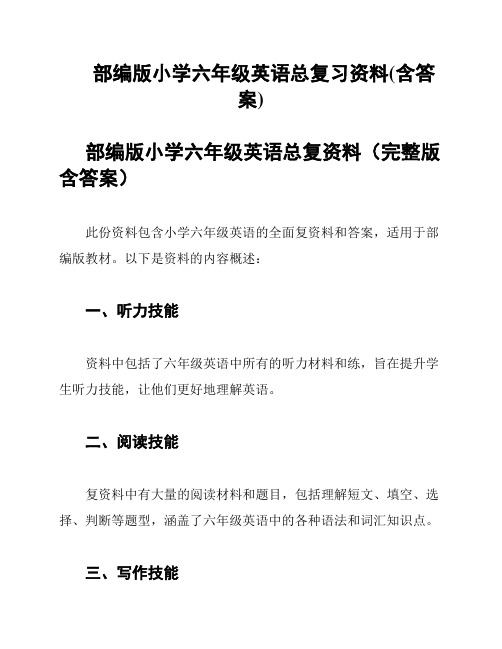
部编版小学六年级英语总复习资料(含答
案)
部编版小学六年级英语总复资料(完整版含答案)
此份资料包含小学六年级英语的全面复资料和答案,适用于部编版教材。
以下是资料的内容概述:
一、听力技能
资料中包括了六年级英语中所有的听力材料和练,旨在提升学生听力技能,让他们更好地理解英语。
二、阅读技能
复资料中有大量的阅读材料和题目,包括理解短文、填空、选择、判断等题型,涵盖了六年级英语中的各种语法和词汇知识点。
三、写作技能
资料中共有35个写作任务,每个任务包括了写作指导、范文和练题。
这些练旨在提高学生的写作能力,让他们能够独立地运用英语进行表达。
四、语言知识点
复资料中还包括了小学六年级英语的所有语法和词汇知识点,其中每个知识点都有详细的讲解和例句,并提供了丰富的练题,帮助学生巩固所学知识。
五、完整的答案
资料中提供了所有练题的答案,包括听力练和阅读练、写作和语言知识点的练,方便学生自行核对。
总的来说,此份资料是一份全面、详细的小学六年级英语复习资料,适用于需要全面回顾英语知识点的学生,也适用于备战期末考试的学生。
希望此资料能够帮助到大家。
2019届小学六年级英语总复习资料(Word版,23页)
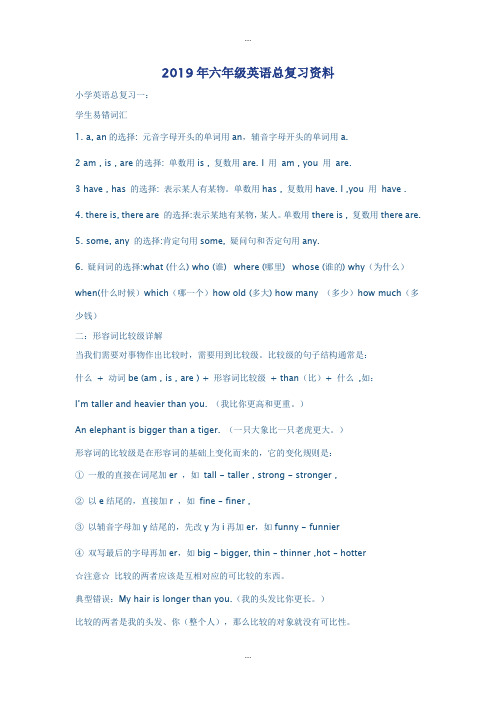
2019年六年级英语总复习资料小学英语总复习一:学生易错词汇1. a, an的选择: 元音字母开头的单词用an,辅音字母开头的单词用a.2 am , is , are的选择: 单数用is , 复数用are. I 用am , you 用are.3 have , has 的选择: 表示某人有某物。
单数用has , 复数用have. I ,you 用have .4. there is, there are 的选择:表示某地有某物,某人。
单数用there is , 复数用there are.5. some, any 的选择:肯定句用some, 疑问句和否定句用any.6. 疑问词的选择:what (什么) who (谁) where (哪里) whose (谁的) why(为什么)when(什么时候)which(哪一个)how old (多大) how many (多少)how much(多少钱)二:形容词比较级详解当我们需要对事物作出比较时,需要用到比较级。
比较级的句子结构通常是:什么+ 动词be (am , is , are ) + 形容词比较级+ than(比)+ 什么,如:I’m taller and heavier than you. (我比你更高和更重。
)An elephant is bigger than a tiger. (一只大象比一只老虎更大。
)形容词的比较级是在形容词的基础上变化而来的,它的变化规则是:①一般的直接在词尾加er ,如tall - taller , strong - stronger ,②以e结尾的,直接加r ,如fine – finer ,③以辅音字母加y结尾的,先改y为i再加er,如funny - funnier④双写最后的字母再加er,如big – bigger, thin – thinner ,hot – hotter☆注意☆比较的两者应该是互相对应的可比较的东西。
(完整word版)六年级上学期英语复习资料

1 How big is Beijing ? It has got about twenty million people.北京有多大?它有大约两千万人。
2 How long is the Great Wall ? It’s more than twenty thousand kilometers long. 长城有多长?它有两万多公里长。
3 Where is the West Lake ? It’s in the east of China.西湖在哪里?它在中国的东部。
4 Where is Hainan? It’s in the south of China.海南在哪里?它中中国的南部。
5 What are you doing ? I’m sending an email to my family in China.你正在干什么?我正在给我中国的家人发送电了邮件。
6 There are lots of Chinese shops and restaurants .那里有许多中国的商店和饭馆。
7 There is Chinese dancing . 那里有中国舞蹈。
8 What’s your hobby? Collecting stamps is my hobby.你的业余爱好是什么?收集邮标是我的业余爱好。
9 Have you got a cat ? Yes, I have . / No, I haven’t.你有一只猫吗?是的,我有。
不,我没有。
10 On Thanksgiving Day we say “thank you” for our food ,family and friends.在感恩节上,我们对我们的食物,家人和朋友说谢谢。
11 What do you do on Flag Day ? We fly the flag and we sing songs.国旗日你们干什么?我们升国旗并唱歌。
最新小学六年级英语总复习资料
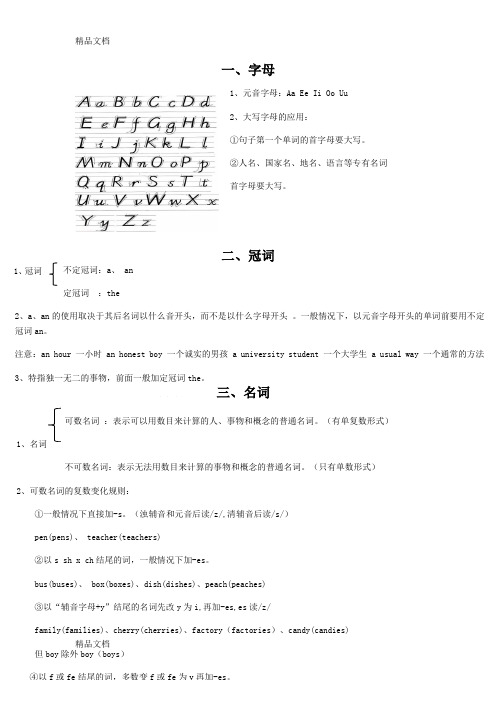
一、字母二、冠词1、元音字母:Aa Ee Ii Oo Uu2、大写字母的应用:①句子第一个单词的首字母要大写。
②人名、国家名、地名、语言等专有名词 首字母要大写。
不定冠词:a 、 an 定冠词 :the2、a 、an 的使用取决于其后名词以什么音开头,而不是以什么字母开头 。
一般情况下,以元音字母开头的单词前要用不定冠词an 。
注意:an hour 一小时 an honest boy 一个诚实的男孩 a university student 一个大学生 a usual way 一个通常的方法 3、特指独一无二的事物,前面一般加定冠词the 。
Eg:The Great Wall is in China.长城在中国。
三、名词可数名词 :表示可以用数目来计算的人、事物和概念的普通名词。
(有单复数形式) 1、名词不可数名词:表示无法用数目来计算的事物和概念的普通名词。
(只有单数形式) 2、可数名词的复数变化规则:①一般情况下直接加-s 。
(浊辅音和元音后读/z/,清辅音后读/s/) pen(pens)、 teacher(teachers)②以s sh x ch 结尾的词,一般情况下加-es 。
bus(buses)、 box(boxes)、dish(dishes)、peach(peaches) ③以“辅音字母+y ”结尾的名词先改y 为i,再加-es,es 读/z/family(families)、cherry(cherries)、factory (factories )、candy(candies)四、代词(一) 人称代词 物主代词 反身代词 主格 宾格 形容词性 名词性单数 I me my mine myself 第一人称复数 we us our ours ourselves 单数 yourself 第二人称 you you your yours复数 yourselves he him his his himself单数 she her her hers herself第三人称 it it its its itself 复数 they them their theirs themselves1、形容词性物主代词后可加名词,名词性物主代词后不可加名词。
【人教版】小学六年级英语总复习资料(Word精编版)
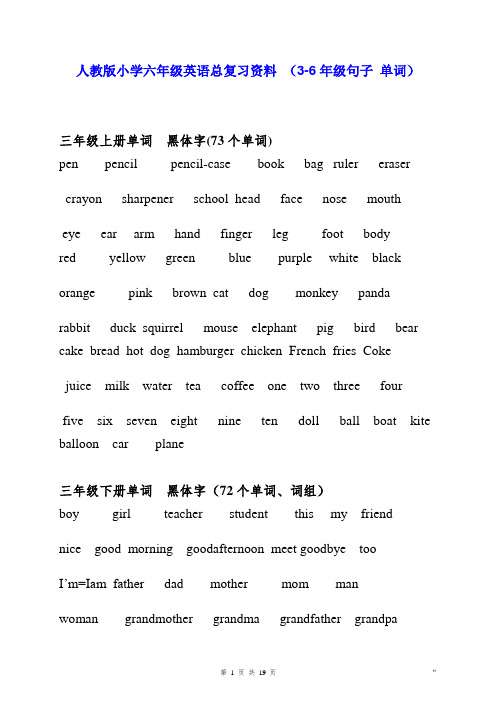
人教版小学六年级英语总复习资料(3-6年级句子单词)三年级上册单词黑体字(73个单词)pen pencil pencil-case book bag ruler erasercrayon sharpener school head face nose moutheye ear arm hand finger leg foot bodyred yellow green blue purple white black orange pink brown cat dog monkey pandarabbit duck squirrel mouse elephant pig bird bear cake bread hot dog hamburger chicken French fries Cokejuice milk water tea coffee one two three fourfive six seven eight nine ten doll ball boat kite balloon car plane三年级下册单词黑体字(72个单词、词组)boy girl teacher student this my friendnice good morning goodafternoon meet goodbye tooI’m=Iam father dad mother mom manwoman grandmother grandma grandfather grandpasister brother let’s=let us really great and howeleve n twelve thirteen fourteen fifteen sixteen seventeen eighteen nineteen twenty how many can look atpeach pear orange watermelon apple banana grape stra wberry like some thanks bus bike taxi jeep desk chair walkman lamp your zoo smal l big long short tall giraffe deer四年级上册单词黑体字(66个单词、词组)window board light picture door floor classroo m computer wall fan teacher’s desk Chinese book Eng lish book math book schoolbag story-book notebook twenty-one thirty thirty-one forty forty-one fifty long hair short hair thin strong quiet friend(s) music science sports computer game paintingstudy bathroom bedroom living kitchen phone be d sofa shelf fridge table rice fish noodles bee f vegetable soup knife chopsticks spoon plat e forkfamily parents uncle aunt baby driver doctor fa rmer nurse baseball player四会单词(36个)bag pencil pen book ruler pencil-case teacher studen t boy girl friendhome room school classroom window desk doo r chair bed rice beef bread milk egg waterchi cken fish sister brother father motherdriver doctor farmer nurse四年级下册单词黑体词(50个单词、词组)playground garden teacher’s desk canteen art room compu ter room washroom music roomgym TV room lunch English class music class breakfast din ner P.E. class get up go to school go home go to bed sweate r jeans pants socks shoes shortshot weather rainy windy cloudy colourful pretty c heap expensive sneakersslippers sandals boots sheep hen lamb goat co w tomatocucumber potato onion carrot四会单词(88个)computer board fan light this is my that your teacher’s desk picture wall floor yes itone two three four five six seven eight nine ten wh at time it’s o’clock mathChinese English P.E. music for class jacket shir t skirt dress T-shirt redblue yellow green white no not colour warm cold cool today jeans pant socksshoes let’s play football snowy sunny how much bi g small long short applebanana pear orange watermelon are they horse aren’t cat rabbit pig duck dogeleven twelve thirteen fifteen twenty how many the re五年级上册单词黑体字(16个单词、词组)principal university student cabbage pork mutton empty the tr ash put away the clothes air-conditioner over in front o f sky cloud mountain village city四会单词、词组(93个)young funny tall strong kind old short thin wh o’s=who is Mr what’s=what is like he’s=he is strict sm art active quiet she’s=she is very but Monday Tu esday Wednesday Thursday Friday day have on Saturda y Sunday do homework watch TV read books What abo ut…? tooeggplant fish green beans tofu potato tomato for lunch w e tasty sweet sour fresh saltyfavourite they’re=they are fruit don’t=do not grape coo k the meals water the flowerssweep the floor clean the bedroom make the bed set the table wash the clothes do the dishescan’t=cannot use acomputer curtain trash bin closet mirror end table bedr oom kitchen bathroom living room in on under near behi nd clothes riverflower grass lake forest path park picture house bridge t ree road building clean五年级下册单词黑体字(18个)January February March April May June July Augus t September October NovemberDecember first second third fourth fifth Eighth nint h twelfth twentieth四会单词、词组(83个)do morning exercises eat breakfast have English class play sp orts eat dinner when eveningget up at usually noon climb mountains go shopping play t he piano visit grandparentsgo hiking weekend often sometimes spring summer fall wi nter season which best swimfly kites skate make a snowman plant trees why because sl eep Jan. Feb. Mar. Apr. May June July Aug. Sept. Oct. No v. Dec. birthday uncle her datedraw pictures cook dinner read a book answer the pho ne listen to music clean the roomwrite a letter write an e-mail mom grandpa study fly jum p walk run swim kangaroosleep climb fight swing drink water take pictures watch insects pick up leavesdo an experiment catch butterflies honey count insects collect leaves write a reportplay chess have a picnic六年级上册单词黑体字(16个)plane ship subway science museum north south eas t west tonight tomorrowtake a trip read a magazine go to the cinema magazin e dictionary vapour四会单词、词组(71个)by foot bike bus train how go to school traffic traffic light traffic rule stop wait get to library post office hosp ital cinema bookstore where please nest to turn right lef t straight then next week this morning this afternoon thi s evening comic book post card newspaper buy hobby ride a bike dive play the violin make kites collect stamps live(s) tea ch(es) go(es) watch(es)read(s) does doesn’t=does not singer write r actor actressartist TV reporter engineer accountant policeman salesperson cl eaner where work raincloud sun stream seed come from soil sprout plant shou ld then六年级下册单词四会单词(25个)taller shorter stronger older younger bigger heavier longe r thinner smaller have a fever hurt have a cold have a toothache have a headache have a sore throat matter sor enose tired excited angry happy bored sad三年级上册句子读下列句子,写出中文意思.1. Hello! ___________ Hi! __________________________ ___2. Hello! I’m Wu Yifan. I’m from China.__________________ ________3. What’s your name?___________________________________ ____4. My name’s Chen Jie. ________________________________ ______5. I have a pencil. ____________________ Me too._________ ________6. Good morning._______________ Good afternoon._________ ______7. This is Miss White. _____________Nice to meet you. ____ ________8. Where are you from? ____________ I’m from America.___________9. Let’s go to school. __________________ OK.________10. . How many cakes? ____________________One cake.______ ____11. How are you? ________________I’m fine, thank you.______ _______12. Let’s paint. _________________ Great.___________________ _____13. I like green._________________ Me too. ________________ ______14. I have a rabbit. ______________________________________ _____15. Cool! ________ Super!_________ Great!________ Wow!____ _____16. May I have a look? ___________________Sure. __________ _______17. Here you are. _________T hank you. __________You’re welc ome18. I like hamburgers._______________ Me too. _____________ ______19. Have some French fries. _______________________________ _____20. Can I have some chicken? ____________________Sure. ____ ______21. How old are you? ____________________ I’m nine. ______ ______三年级下册句子1. Where are you from? I’m from America.2. Good morning! Good afternoon!3. Class, we have a new friend today.4. Who’s that woman?She’s my mother。
小学六年级英语全套复习资料

英语复习资料教师版·复习资料(讲义·答案)·试卷分析(答案·分析)·学生资料(资料·卡表)小学六年级英语复习资料目录第一部分复习资料1、一般过去时(讲义).................................................................................................. ..........................................P1(答案).................................................................................................. ..........................................P32、一般现在时(讲义).................................................................................................. ..........................................P7(答案).................................................................................................. ..........................................P93、一般将来时(讲义).................................................................................................. ..........................................P17(答案).................................................................................................. ..........................................P194、现在进行时(讲义).................................................................................................. ..........................................P23(答案).................................................................................................. ..........................................P255、There be (讲义).................................................................................................. ..........................................P27(答案).................................................................................................. ..........................................P296、情态动词(讲义).................................................................................................. ..........................................P33(答案).................................................................................................. ..........................................P357、时态对比(讲义).................................................................................................. ..........................................P37(答案).................................................................................................. ..........................................P418、比较级(讲义).................................................................................................. ..........................................P49(答案).................................................................................................. ..........................................P519、be 和do (讲义).................................................................................................. ..........................................P53(答案).................................................................................................. ..........................................P5710、人称和数(讲义).................................................................................................. ..........................................P59(答案)............................................................................................................................................P6111、单词短语(答案).................................................................................................. ..........................................P6512、教材知识整理.................................................................................................... ........................................................P6913、英语作文(答案).................................................................................................. ..........................................P7714、其他.................................................................................................... ........................................................................P81第二部分试卷分析1、期中检测试卷T2(答案).................................................................................................. ......................................P832、单元检测试卷R1(答案).................................................................................................. ......................................P87(分析).................................................................................................. ......................................P913、单元检测试卷R2(答案).................................................................................................. ......................................P93(分析).................................................................................................. ......................................P974、第一次模拟试卷(答案).................................................................................................. ......................................P99(分析).................................................................................................. ......................................P1035、第二次模拟试卷(答案).................................................................................................. ......................................P105(分析).................................................................................................. ......................................P1096、第三次模拟试卷(答案).................................................................................................. ......................................P111(分析).................................................................................................. ......................................P115第三部分学生资料1、学生读背句型.................................................................................................... ........................................................P1172、学生错题卡.................................................................................................... ............................................................P1213、学生单词错漏卡.................................................................................................... ....................................................P123一般过去时answer ed ask ed brush ed catch ed clean ed climb ed collect ed cook ed count ed finish ed fish ed guess ed help ed join ed jump ed kick ed learn ed listen ed look ed open ed pass ed perform ed plant ed reach ed row ed show ed snow ed talk ed touch ed turn ed visit ed walk ed wash ed watch ed work edclose d dance d hike d hope d like d live d love d move d recite d shine d skate d taste d use dcarry carr ied crycr iedflyfl ied/fl ewstudystud iedworry worr iedplay ed stay ed driveplan ned stop ped shop pedam are become begin buy build come cutdo draw drink drive eat feel find forget get give go have hear hide-hid hurt is keep know leave let make meet put read ride run say see seek-sought sell send shut sing sit sleep sweep swim take teach tell think throw wake will win write一般过去时练习一、填空(一)写出下列动词的过去式形式answer ed ask ed bec a me beg a n clean ed climb ed close d collect edc a me cook ed count ed cut dance d dr e w dr a nk dr o veate f ou nd forg o t g o t g a ve help ed hide-hid hike dhope d hurt join ed jump ed ke pt kick ed learn ed le ftlet like d listen ed live d look ed love d ma d e me tmove d open ed perform ed plan ned plant ed put read recite dr o de row ed r a n s aw seek-s ough t shine d shop ped show eds a t skate d sle pt snow ed stop ped sw a m t ook talk edtaste d turn ed use d visit ed w o ke walk ed work ed wr o tebrush ed catch ed d id finish ed fish ed go-went guess ed pass edreach ed t aught touch ed wash ed watch ed carr ied fl ied / fl ew stud iedworr ied cr ied b ought play ed s aid stay ed ha s w oulds a ng w o n kn e w thr e w sen t buil t swe pt fe ltshut th ought t old hear t s old am-was is-was are-were (二)用动词的适当形式填空。
- 1、下载文档前请自行甄别文档内容的完整性,平台不提供额外的编辑、内容补充、找答案等附加服务。
- 2、"仅部分预览"的文档,不可在线预览部分如存在完整性等问题,可反馈申请退款(可完整预览的文档不适用该条件!)。
- 3、如文档侵犯您的权益,请联系客服反馈,我们会尽快为您处理(人工客服工作时间:9:00-18:30)。
2019年六年级英语总复习资料小学英语总复习一:学生易错词汇1. a, an的选择: 元音字母开头的单词用an,辅音字母开头的单词用a.2 am , is , are的选择: 单数用is , 复数用are. I 用am , you 用are.3 have , has 的选择: 表示某人有某物。
单数用has , 复数用have. I ,you 用have .4. there is, there are 的选择:表示某地有某物,某人。
单数用there is , 复数用there are.5. some, any 的选择:肯定句用some, 疑问句和否定句用any.6. 疑问词的选择:what (什么) who (谁) where (哪里) whose (谁的) why(为什么)when(什么时候)which(哪一个)how old (多大) how many (多少)how much(多少钱)二:形容词比较级详解当我们需要对事物作出比较时,需要用到比较级。
比较级的句子结构通常是:什么+ 动词be (am , is , are ) + 形容词比较级+ than(比)+ 什么,如:I’m taller and heavier than you. (我比你更高和更重。
)An elephant is bigger than a tiger. (一只大象比一只老虎更大。
)形容词的比较级是在形容词的基础上变化而来的,它的变化规则是:①一般的直接在词尾加er ,如tall - taller , strong - stronger ,②以e结尾的,直接加r ,如fine – finer ,③以辅音字母加y结尾的,先改y为i再加er,如funny - funnier④双写最后的字母再加er,如big – bigger, thin – thinner ,hot – hotter☆注意☆比较的两者应该是互相对应的可比较的东西。
典型错误:My hair is longer than you.(我的头发比你更长。
)比较的两者是我的头发、你(整个人),那么比较的对象就没有可比性。
应该改为:My hair is longer than yours. 或My hair is longer than your hair. 比较级专项练习一、从方框中选出合适的单词完成句子heavy tall long big(1) How is the Yellow River?(2) How is Mr Green? He’s 175cm.(3) How are your feet? I wear size 18.(4)How is the fish? It’s 2kg.二、根据句意写出所缺的单词(1) I’m 12 years old. You’re 14. I’m than you.(2) A rabbit’s tail is than a monkey’s tail.(3) An elephant is than a pig.(4) A lake is than a sea.(5) A basketball is than a football.三、根据中文完成句子.(1)? 我比我的弟弟大三岁. I’m than my brother.(2)? 这棵树要比那棵树高. This tree than that one.(3)? 你比他矮四厘米. You are than he.(4)? 谁比你重? than you?四、根据答句写出问句(1) I’m 160 cm.(2) I’m 12 years old.(4) Amy’s hair is 30 cm long.三:动词过去式详解动词的过去式的构成规则有:A、规则动词①????一般直接在动词的后面加ed如worked , learned , cleaned , visited②以e结尾的动词直接加d如lived , danced , used③????以辅音字母加y结尾的动词要改y为i再加ed(此类动词较少)如study – studied carry – carried worry – worried (play、stay)④双写最后一个字母(此类动词较少)如stoppedB、不规则动词(此类词并无规则,须熟记)小学阶段要记住以下动词的原形和过去式:sing – sang , eat – ate , see – saw , have – had , do – did , go – went , take – took , buy – bought , get – got , read – read ,fly – flew , am/is – was ,are – were , say – said , leave – left , swim – swam , tell – told , draw – drew , come – came , lose – lost , find – found , drink – drank , hurt – hurt , feel – felt四:动词现在分词详解动词的ing形式的构成规则:①??? 一般的直接在后面加上ing , 如doing , going , working , singing , eating②以e 结尾的动词,要先去e再加ing,如having , writing③双写最后一个字母的(此类动词极少)有:running , swimming , sitting , getting 五:人称和数人称代词物主代词主格宾格第一人称单数 I(我) me my(我的)复数 we(我们) us our(我们的)第二人称单数 you(你) you your(你的)复数 you(你们) you your(你们的)第三人称单数 he(他) him his(他的) she(她) her her(她的) it(它) it its(它的)复数 they(他们/她们/它们) them their(他们的/她们的/它们的)六:句型专项归类肯定句:是指用肯定的语气来陈述的句子,如:I’m a student.She is a doctor. He works in a hospital.There are four fans in our classroom. He will eat lunch at 12:00. I watched TV yesterday evening.2、否定句:含有否定词或表示否定意义词的句子,如:I’m not a student.She is not (isn’t)a doctor.He does not (doesn’t) work in a hospit al. There are not (aren’t) four fans in our classroom.He will not (won’t) eat lunch at 12:00.I did not (didn’t) watch TV yesterday evening.☆注意☆小结:否定句主要是在肯定句的基础上加上了否定词“not”。
有动词be的句子则“not”加在be后面,可缩写成“isn’t,aren’t”,但am not 一般都分开写。
没有动词be的句子则要先在主要动词的前面加上一个助动词(do,does,did),然后在它后面加上“not”,你也可以把它们缩写在一起如“don’t , doesn’t , didn’t )。
这三个助动词要根据人称和时态来选择,其中“does”只用于一般现在时主语是第三人称单数的情况,而“did”只用于一般过去时,不论主语是什么人称和数,都用“did” 。
3、一般疑问句:是指询问事实的句子,此类句子必须用“yes”,或“no”来回答。
如:Are you a student? Yes, I am / No, I’m no t.Is she a doctor? Yes, she is. / No, she isn’t.Does he work in a hospital? Yes, he does. / No, he doesn’t.Are there four fans in our classroom? Yes, there are. / No, there aren’t.Are you going to buy a comic book tonight? Yes, I am. / No, No, I am not. (Yes, we are. / No, we aren’t.)Will he eat lunch at 12:00? Yes, I will. / No, I will not(won’t).Are they swimming? Yes, they are. / No, they aren’t.Did you watch TV yesterday evening? Yes, I did. / No, I didn’t.☆注意☆小结:一般疑问句是在肯定句的基础上,①把动词be调到首位,其他照写,末尾标点符号变成问号即可。
②没有动词be的句子则要在句首加上一个助动词(do,does,did)再把紧跟在后面的动词变回原形,末尾标点符号变成问号即可。
这三个助动词也要根据人称和时态来选择,其中“does”只用于一般现在时主语是第三人称单数的情况,而“did”只用于一般过去时,不论主语是什么人称和数,都用“did” 。
一般疑问句有个重要的原则就是问和答要一致,即问句里的第一个单词(助动词)和简略答句里的这个词是一致的。
4、特殊疑问句:以特殊疑问词(what , where , who , which , when , whose , why , how 等)开头引导的句子。
此类句子应该问什么就答什么,不能用“yes 、no”来回答。
如:What is this? It’s a computer.What does he do? He’s a doctor.Where are you going? I’m going to Beijing.Who played football with you yesterday afternoon? Mike.Which season do you like best? Summer.When do you usually get up? I usually get up at 6:30.Whose skirt is this? It’s Amy’s.Why do you like spring best? Because I can plant trees.How are you? I’m fine. / I’m happy.How did you go to Xinjiang? I went to Xinjiang by train.☆其中how又可以和其他一些形容词连用组成特殊疑问词组用来提问,如:how many(多少(数量)), how much(多少(钱)), how tall(多高), how long(多长), how big (多大), how heavy(多重)例句:How many pencils do you have? I have three pencils.How many girls can you see? I can see four girls.How many desks are there in your classroom? There are 51.☆小结:how many 用来提问可数名词的数量,主要有以上三种句式搭配,How many + 名词复数+ do you have? 你有多少……?How many + 名词复数+ can you see? 你能看见多少……?How many + 名词复数+ are there…?有多少……?七:完全、缩略形式: I’m=I am he’s=he is she’s=she i s they’re=theyare you’re=you are there’s=there is they’re=they are can’t=cannot don’t=do not doesn’t=does not isn’t=is not aren’t=are not let’s=let us won’t=will not I’ll=I will wasn’t=was not总结:通常情况下,'m即am,'s即is(但let’s=let us),'re即are ,n't即not (但can’t=can not)八:与字母相关的题型( 注:五个元音字母是Aa Ee Ii Oo Uu )二.写出下列字母的左邻右舍。
